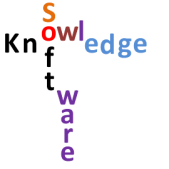Workshop
5th International Workshop on Software Knowledge -
SKY
2014
22 October, 2014 - Rome, Italy
In conjunction with the International Joint Conference on Knowledge Discovery, Knowledge Engineering and Knowledge Management - IC3K 2014
Scope
"Software Knowledge" – in short SKY – means that software in its higher abstraction levels is a new kind of knowledge, Runnable knowledge.
Thus, the classes and relationships of a software UML diagram are easily viewed as the classes and relationships of a knowledge ontology.
For further details visit SoftwareKnowledge.org.
The main theme of the SKY2014 Workshop is Requirements and Software Knowledge.
Time is ripe to investigate the promising implications of Software Knowledge ideas to real life Software Systems' Requirements.
The Workshop main objective is to discuss and propose practical tools to deal not only with experimental and laboratory research, but to facilitate formulation and
verification of requirements for industrial grade and production software systems.
|
 |
Topics of Interest
Software Knowledge is a
runnable expression of meaning.
Running facilitates understanding in
a very general sense. This is the rationale for the debugging process in a micro scale, where
one runs and breaks at desired points to understand the reason of software failures. This is the
basis of agile methods to manufacture and test concurrently, in a medium scale. This is the
possible source of great new tools, in a macro scale, from the software hierarchy
highest abstraction levels down to executable code.
SKY2014 topics of relevance include but are not limited to:
Software-Knowledge Requirements, Tools and Operations
- Software-Knowledge Requirements for Large Scale Systems
- Abstract Operations for Industrial Applications
- Software-Knowledge selectivity and traceability
- Software-Knowledge Sharing: Meta-models, interchange formats, and tools
- Knowledge Driven Architecture and Engineering
Software-Knowledge Runnability and Meaning
- Ontologies in complex systems
- Ontologies for Software Requirements verification
- Semantics above and beyond design patterns
- Runnable and testable knowledge representations
- Software-Knowledge representation and modeling
- Web dynamics and interestingness
Expected Outcomes
Expected outcomes of the SKY2014 Workshop are:
⇒ Proposals of new tools for large-scale Software-Knowledge Requirements verification and production.
⇒ A continuing effort to standardize a Software-Knowledge representation consisting of software models encompassing semantics as first class objects.
IMPORTANT DATES
Paper Submission:
July 27, 2014 (expired)
Authors Notification:
August 4, 2014 (expired)
Camera Ready and Registration:
August 14, 2014 (expired)
PROGRAM COMMITTEE MEMBERS
Hernan Astudillo,
UniversidadTécnica Federico Santa María, Chile
Sidney Bailin,
Independent Researcher, United States
Yishai Feldman,
, Israel
Bill Frakes,
Independent Researcher, United States
Reuven Gallant,
JCT Lev Academic Center, Israel
Gonzalo Genova,
Carlos III University of Madrid, Spain
Paulo Gomes,
Cisuc - Universidade de Coimbra, Portugal
David Rine,
George Mason University, United States
Dumitru Roman,
SINTEF / University of Oslo, Norway
Michal Smialek,
Warsaw University of Technology, Poland
Daniel Speicher,
University of Bonn, Germany
Ioan Toma,
University Innsbruck, Austria
Rafael Valencia-Garcia,
Universidad de Murcia, Spain
Reuven Yagel,
Azrieli - The Jerusalem College of Engineering, Israel
(list not yet complete)
Invited Speakers
Only the New? Knowledge Reuse in Innovation

|
John Favaro
Consulenza Informatica
Italy
|
|
|
|
Brief Bio
John Favaro is a consultant based in Pisa, Italy and Associate Editor of IEEE Software in the
management area. He is a founding member of the International Society for the Advancement of
Software Education and was Program Chair of the 13th International Conference on Software Reuse
in 2013. In 1998 he introduced Value Based Software Reuse Investment, applying the ideas of Value
Based Management to the analysis of investments in software reuse. Recently he has investigated the
relationship of Value Based Management to agile development processes. He took his degrees in
computer science at Yale University and the University of California at Berkeley.
|
Abstract
Innovation is normally associated with the generation of entirely new knowledge. But a number of
research results in recent years have yielded new insights on the way that the mind works to produce
successful innovation. What is known as "strategic intuition" involves the intelligent recombination of
precedents – reusable knowledge – to form new solutions to strategic innovation problems, and
provides the elements of a systematic approach to innovation.
|
Towards an Ontology of Software

|
Nicola Guarino
Institute of Cognitive Sciences and Technologies of the Italian National Research Council (ISTC-CNR)
Italy
|
|
|
|
Brief Bio
Nicola Guarino is research director at the Institute of Cognitive Sciences and Technologies of the Italian National Research Council (ISTC-CNR), where he leads the Laboratory for Applied Ontology (LOA) in Trento.
Since 1991 he has been playing a leading role in the ontology field, developing a strongly interdisciplinary approach that combines together Computer Science, Philosophy, and Linguistics.
His impact is testified by a long list of widely cited papers and many keynote talks and tutorials in major conferences involving different communities.
Among the most well known results of his lab, the OntoClean methodology and the DOLCE foundational ontology. Current research interests include conceptual modeling, service science, socio-technical systems, and e-government.
He is founder and editor-in-chief (with Mark Musen) of the Applied Ontology journal, founder and past president of the International Association for Ontology and its Applications, and editorial board member of Int. Journal of Semantic Web and Information Systems and Journal of Data Semantics.
|
Abstract
For many, software is just code, something intangible best defined in contrast with hardware, but this is not particularly illuminating.
Microsoft Word turned 30 last year. During its lifetime it has been the subject of numerous changes, as its requirements, code and documentation have continuously evolved.
Still a community of users recognizes it as "the same software product", a persistent object undergoing several changes through a social process involving owners, developers, salespeople and users, and it is still producing recognizable effects that meet the same core requirements.
It is this process that makes software something different than just a piece of code, and justifies its intrinsic nature as a social artifact. Building on Jackson's and Zave's seminal work on foundations of requirements engineering, I will present in this talk a first attempt towards an ontology of software and related notions that accounts for such intuitions, and adopt it in software configuration management to provide a better understanding and control of software changes.
This is ongoing work with Giancarlo Guizzardi, John Mylopoulos, and Xiaowei Wang.
|
PAPER SUBMISSION
Prospective authors are invited to submit papers in any of the topics listed above.
Instructions for preparing the manuscript (in Word and Latex formats) are available at: Paper Templates
Please also check the Guidelines.
Papers must be submitted electronically via the web-based submission system using the appropriated button on this page.
Publication
All accepted papers, including position papers, will be published in the workshop proceedings book and on CD-ROM support, under an ISBN reference.
All papers presented at the conference venue will be available at the SciTePress Digital Library (
http://www.scitepress.org/DigitalLibrary/).
SciTePress is member of CrossRef (
http://www.crossref.org/).
Previous Editions
For information on previous SKY Workshops please visit the
SoftwareKnowledge.org web site.
Registration Information
At least one author of an accepted paper must register for the workshop, and the registration fees received by
August 12, 2014, in order to have the paper published in the workshop proceedings book.